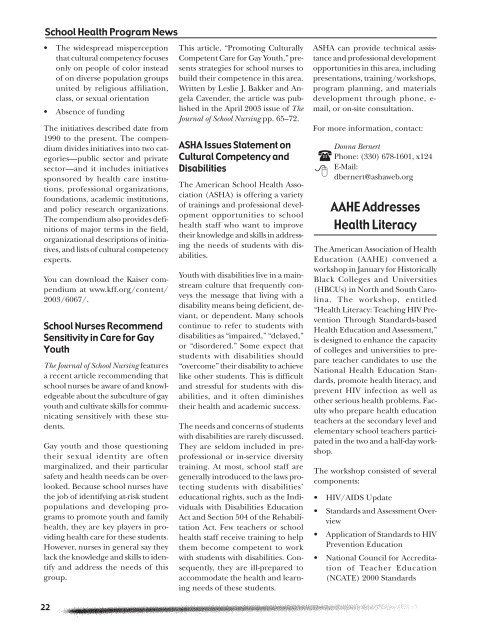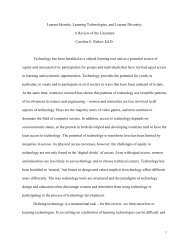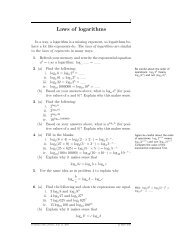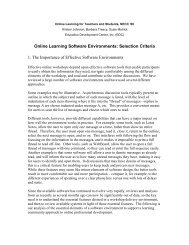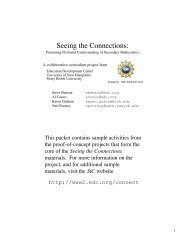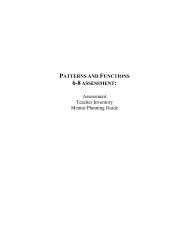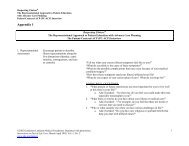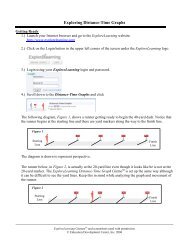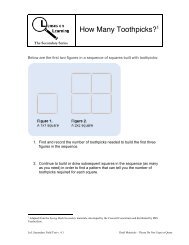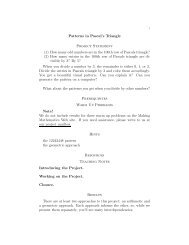School Health Program News - Education Development Center
School Health Program News - Education Development Center
School Health Program News - Education Development Center
Create successful ePaper yourself
Turn your PDF publications into a flip-book with our unique Google optimized e-Paper software.
<strong>School</strong> <strong>Health</strong> <strong>Program</strong> <strong>News</strong>• The widespread misperceptionthat cultural competency focusesonly on people of color insteadof on diverse population groupsunited by religious affiliation,class, or sexual orientation• Absence of fundingThe initiatives described date from1990 to the present. The compendiumdivides initiatives into two categories—publicsector and privatesector—and it includes initiativessponsored by health care institutions,professional organizations,foundations, academic institutions,and policy research organizations.The compendium also provides definitionsof major terms in the field,organizational descriptions of initiatives,and lists of cultural competencyexperts.You can download the Kaiser compendiumat www.kff.org/content/2003/6067/.<strong>School</strong> Nurses RecommendSensitivity in Care for GayYouthThe Journal of <strong>School</strong> Nursing featuresa recent article recommending thatschool nurses be aware of and knowledgeableabout the subculture of gayyouth and cultivate skills for communicatingsensitively with these students.Gay youth and those questioningtheir sexual identity are oftenmarginalized, and their particularsafety and health needs can be overlooked.Because school nurses havethe job of identifying at-risk studentpopulations and developing programsto promote youth and familyhealth, they are key players in providinghealth care for these students.However, nurses in general say theylack the knowledge and skills to identifyand address the needs of thisgroup.This article, “Promoting CulturallyCompetent Care for Gay Youth,” presentsstrategies for school nurses tobuild their competence in this area.Written by Leslie J. Bakker and AngelaCavender, the article was publishedin the April 2003 issue of TheJournal of <strong>School</strong> Nursing pp. 65–72.ASHA Issues Statement onCultural Competency andDisabilitiesThe American <strong>School</strong> <strong>Health</strong> Association(ASHA) is offering a varietyof trainings and professional developmentopportunities to schoolhealth staff who want to improvetheir knowledge and skills in addressingthe needs of students with disabilities.Youth with disabilities live in a mainstreamculture that frequently conveysthe message that living with adisability means being deficient, deviant,or dependent. Many schoolscontinue to refer to students withdisabilities as “impaired,” “delayed,”or “disordered.” Some expect thatstudents with disabilities should“overcome” their disability to achievelike other students. This is difficultand stressful for students with disabilities,and it often diminishestheir health and academic success.The needs and concerns of studentswith disabilities are rarely discussed.They are seldom included in preprofessionalor in-service diversitytraining. At most, school staff aregenerally introduced to the laws protectingstudents with disabilities’educational rights, such as the Individualswith Disabilities <strong>Education</strong>Act and Section 504 of the RehabilitationAct. Few teachers or schoolhealth staff receive training to helpthem become competent to workwith students with disabilities. Consequently,they are ill-prepared toaccommodate the health and learningneeds of these students.ASHA can provide technical assistanceand professional developmentopportunities in this area, includingpresentations, training/workshops,program planning, and materialsdevelopment through phone, e-mail, or on-site consultation.For more information, contact:Donna BernertPhone: (330) 678-1601, x124E-Mail:dbernert@ashaweb.orgAAHE Addresses<strong>Health</strong> LiteracyThe American Association of <strong>Health</strong><strong>Education</strong> (AAHE) convened aworkshop in January for HistoricallyBlack Colleges and Universities(HBCUs) in North and South Carolina.The workshop, entitled“<strong>Health</strong> Literacy: Teaching HIV PreventionThrough Standards-based<strong>Health</strong> <strong>Education</strong> and Assessment,”is designed to enhance the capacityof colleges and universities to prepareteacher candidates to use theNational <strong>Health</strong> <strong>Education</strong> Standards,promote health literacy, andprevent HIV infection as well asother serious health problems. Facultywho prepare health educationteachers at the secondary level andelementary school teachers participatedin the two and a half-day workshop.The workshop consisted of severalcomponents:• HIV/AIDS Update• Standards and Assessment Overview• Application of Standards to HIVPrevention <strong>Education</strong>• National Council for Accreditationof Teacher <strong>Education</strong>(NCATE) 2000 Standards22


